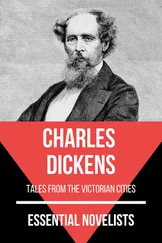Mamie Dickens - My Father as I Recall Him
Здесь есть возможность читать онлайн «Mamie Dickens - My Father as I Recall Him» — ознакомительный отрывок электронной книги совершенно бесплатно, а после прочтения отрывка купить полную версию. В некоторых случаях можно слушать аудио, скачать через торрент в формате fb2 и присутствует краткое содержание. Жанр: foreign_antique, foreign_prose, на английском языке. Описание произведения, (предисловие) а так же отзывы посетителей доступны на портале библиотеки ЛибКат.
- Название:My Father as I Recall Him
- Автор:
- Жанр:
- Год:неизвестен
- ISBN:нет данных
- Рейтинг книги:3 / 5. Голосов: 1
-
Избранное:Добавить в избранное
- Отзывы:
-
Ваша оценка:
- 60
- 1
- 2
- 3
- 4
- 5
My Father as I Recall Him: краткое содержание, описание и аннотация
Предлагаем к чтению аннотацию, описание, краткое содержание или предисловие (зависит от того, что написал сам автор книги «My Father as I Recall Him»). Если вы не нашли необходимую информацию о книге — напишите в комментариях, мы постараемся отыскать её.
My Father as I Recall Him — читать онлайн ознакомительный отрывок
Ниже представлен текст книги, разбитый по страницам. Система сохранения места последней прочитанной страницы, позволяет с удобством читать онлайн бесплатно книгу «My Father as I Recall Him», без необходимости каждый раз заново искать на чём Вы остановились. Поставьте закладку, и сможете в любой момент перейти на страницу, на которой закончили чтение.
Интервал:
Закладка:
Mamie Dickens
My Father as I Recall Him
CHAPTER I
Seeing “Gad’s Hill” as a child. – His domestic side and home-love. – His love of children. – His neatness and punctuality. – At the table, and as host. – The original of “Little Nell.”
If, in these pages, written in remembrance of my father, I should tell you my dear friends, nothing new of him, I can, at least, promise you that what I shall tell will be told faithfully, if simply, and perhaps there may be some things not familiar to you.
A great many writers have taken it upon themselves to write lives of my father, to tell anecdotes of him, and to print all manner of things about him. Of all these published books I have read but one, the only genuine “Life” thus far written of him, the one sanctioned by my father himself, namely: “The Life of Charles Dickens,” by John Forster.
But in what I write about my father I shall depend chiefly upon my own memory of him, for I wish no other or dearer remembrance. My love for my father has never been touched or approached by any other love. I hold him in my heart of hearts as a man apart from all other men, as one apart from all other beings.
Of my father’s childhood it is but natural that I should know very little more than the knowledge possessed by the great public. But I never remember hearing him allude at any time, or under any circumstances, to those unhappy days in his life except in the one instance of his childish love and admiration for “Gad’s Hill,” which was destined to become so closely associated with his name and works.
He had a very strong and faithful attachment for places: Chatham, I think, being his first love in this respect. For it was here, when a child, and a very sickly child, poor little fellow, that he found in an old spare room a store of books, among which were “Roderick Random,” “Peregrine Pickle,” “Humphrey Clinker,” “Tom Jones,” “The Vicar of Wakefield,” “Don Quixote,” “Gil Blas,” “Robinson Crusoe,” “The Arabian Nights,” and other volumes. “They were,” as Mr. Forster wrote, “a host of friends when he had no single friend.” And it was while living at Chatham that he first saw “Gad’s Hill.”
As a “very queer small boy” he used to walk up to the house – it stood on the summit of a high hill – on holidays, or when his heart ached for a “great treat.” He would stand and look at it, for as a little fellow he had a wonderful liking and admiration for the house, and it was, to him, like no other house he had ever seen. He would walk up and down before it with his father, gazing at it with delight, and the latter would tell him that perhaps if he worked hard, was industrious, and grew up to be a good man, he might some day come to live in that very house. His love for this place went through his whole life, and was with him until his death. He takes “Mr. Pickwick” and his friends from Rochester to Cobham by the beautiful back road, and I remember one day when we were driving that way he showed me the exact spot where “Mr. Pickwick” called out: “Whoa, I have dropped my whip!” After his marriage he took his wife for the honeymoon to a village called Chalk, between Gravesend and Rochester.
Many years after, when he was living with his family in a villa near Lausanne, he wrote to a friend: “The green woods and green shades about here are more like Cobham, in Kent, than anything we dream of at the foot of the Alpine passes.” And again, in still later years, one of his favorite walks from “Gad’s Hill” was to a village called Shorne, where there was a quaint old church and graveyard. He often said that he would like to be buried there, the peace and quiet of the homely little place having a tender fascination for him. So we see that his heart was always in Kent.
But let this single reference to his earlier years suffice, so that I may write of him during those years when I remember him among us and around us in our home.
From his earliest childhood, throughout his earliest married life to the day of his death, his nature was home-loving. He was a “home man” in every respect. When he became celebrated at a very early age, as we know, all his joys and sorrows were taken home; and he found there sympathy and the companionship of his “own familiar friends.” In his letters to these latter, in his letters to my mother, to my aunt, and, later on, to us his children, he never forgot anything that he knew would be of interest about his work, his successes, his hopes or fears. And there was a sweet simplicity in his belief that such news would most certainly be acceptable to all, that is wonderfully touching and child-like coming from a man of genius.
His care and thoughtfulness about home matters, nothing being deemed too small or trivial to claim his attention and consideration, were really marvellous when we remember his active, eager, restless, working brain. No man was so inclined naturally to derive his happiness from home affairs. He was full of the kind of interest in a house which is commonly confined to women, and his care of and for us as wee children did most certainly “pass the love of women!” His was a tender and most affectionate nature.
For many consecutive summers we used to be taken to Broadstairs. This little place became a great favorite with my father. He was always very happy there, and delighted in wandering about the garden of his house, generally accompanied by one or other of his children. In later years, at Boulogne, he would often have his youngest boy, “The Noble Plorn,” trotting by his side. These two were constant companions in those days, and after these walks my father would always have some funny anecdote to tell us. And when years later the time came for the boy of his heart to go out into the world, my father, after seeing him off, wrote: “Poor Plorn has gone to Australia. It was a hard parting at the last. He seemed to become once more my youngest and favorite little child as the day drew near, and I did not think I could have been so shaken. These are hard, hard things, but they might have to be done without means or influence, and then they would be far harder. God bless him!”
When my father was arranging and rehearsing his readings from “Dombey,” the death of “little Paul” caused him such real anguish, the reading being so difficult to him, that he told us he could only master his intense emotion by keeping the picture of Plorn, well, strong and hearty, steadily before his eyes. We can see by the different child characters in his books what a wonderful knowledge he had of children, and what a wonderful and truly womanly sympathy he had with them in all their childish joys and griefs. I can remember with us, his own children, how kind, considerate and patient he always was. But we were never afraid to go to him in any trouble, and never had a snub from him or a cross word under any circumstances. He was always glad to give us “treats,” as he called them, and used to conceive all manner of those “treats” for us, and if any favor had to be asked we were always sure of a favorable answer. On these occasions my sister “Katie” was generally our messenger, we others waiting outside the study door to hear the verdict. She and I used to have delightful treats in those summer evenings, driving up to Hampstead in the open carriage with him, our mother, and “Auntie,” 1 1 When I write about my aunt, or “Auntie,” as no doubt I may often have occasion to do, it is of the aunt par excellence , Georgina Hogarth. She has been to me ever since I can remember anything, and to all of us, the truest, best and dearest friend, companion and counsellor. To quote my father’s own words: “The best and truest friend man ever had.”
and getting out for a long walk through the lovely country lanes, picking wild roses and other flowers, or walking hand in hand with him listening to some story.
Интервал:
Закладка:
Похожие книги на «My Father as I Recall Him»
Представляем Вашему вниманию похожие книги на «My Father as I Recall Him» списком для выбора. Мы отобрали схожую по названию и смыслу литературу в надежде предоставить читателям больше вариантов отыскать новые, интересные, ещё непрочитанные произведения.
Обсуждение, отзывы о книге «My Father as I Recall Him» и просто собственные мнения читателей. Оставьте ваши комментарии, напишите, что Вы думаете о произведении, его смысле или главных героях. Укажите что конкретно понравилось, а что нет, и почему Вы так считаете.












